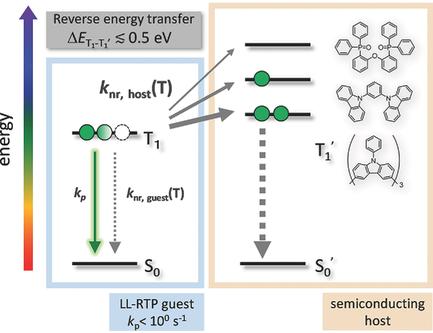当前位置:
X-MOL 学术
›
Adv. Funct. Mater.
›
论文详情
Our official English website, www.x-mol.net, welcomes your feedback! (Note: you will need to create a separate account there.)
Confinement of Long‐Lived Triplet Excitons in Organic Semiconducting Host–Guest Systems
Advanced Functional Materials ( IF 19.0 ) Pub Date : 2017-09-20 , DOI: 10.1002/adfm.201703902 Naoto Notsuka 1 , Ryota Kabe 1, 2 , Kenichi Goushi 1, 2, 3 , Chihaya Adachi 1, 2, 3
Advanced Functional Materials ( IF 19.0 ) Pub Date : 2017-09-20 , DOI: 10.1002/adfm.201703902 Naoto Notsuka 1 , Ryota Kabe 1, 2 , Kenichi Goushi 1, 2, 3 , Chihaya Adachi 1, 2, 3
Affiliation

|
Long‐lived triplet excitons on organic molecules easily deactivate at room temperature because of the presence of thermally activated nonradiative pathways. This study demonstrates long‐lived phosphorescence at room temperature resulting from suppression of the nonradiative deactivation of triplet excitons in conventional organic semiconducting host–guest systems. The nonradiative deactivation pathway strongly depends on the triplet energy gap between the guest emitting molecules and the host matrices. The triplet energy gap required to confine the long‐lived triplet excitons (≈0.5 eV) is much larger than that of conventional host–guest systems for phosphorescent emitters. By effectively confining the triplet excitons, this study demonstrates long‐lived room‐temperature phosphorescence under optical and electrical excitation.
中文翻译:

长寿命三重态激子在有机半导体宿主-客体系统中的限制
由于存在热激活的非辐射途径,有机分子上的长寿命三重态激子在室温下很容易失活。这项研究表明,在室温下长寿命的磷光是由于抑制了传统有机半导体-客体-客体系统中三重态激子的非辐射失活所致。非辐射失活途径在很大程度上取决于客体发射分子与宿主基质之间的三重态能隙。限制长寿命三重态激子所需的三重态能隙(约0.5 eV)远大于用于磷光发射体的常规宿主-客体系统的能隙。通过有效地限制三重态激子,本研究证明了在光和电激发下长寿命的室温磷光。
更新日期:2017-09-20
中文翻译:

长寿命三重态激子在有机半导体宿主-客体系统中的限制
由于存在热激活的非辐射途径,有机分子上的长寿命三重态激子在室温下很容易失活。这项研究表明,在室温下长寿命的磷光是由于抑制了传统有机半导体-客体-客体系统中三重态激子的非辐射失活所致。非辐射失活途径在很大程度上取决于客体发射分子与宿主基质之间的三重态能隙。限制长寿命三重态激子所需的三重态能隙(约0.5 eV)远大于用于磷光发射体的常规宿主-客体系统的能隙。通过有效地限制三重态激子,本研究证明了在光和电激发下长寿命的室温磷光。



























 京公网安备 11010802027423号
京公网安备 11010802027423号